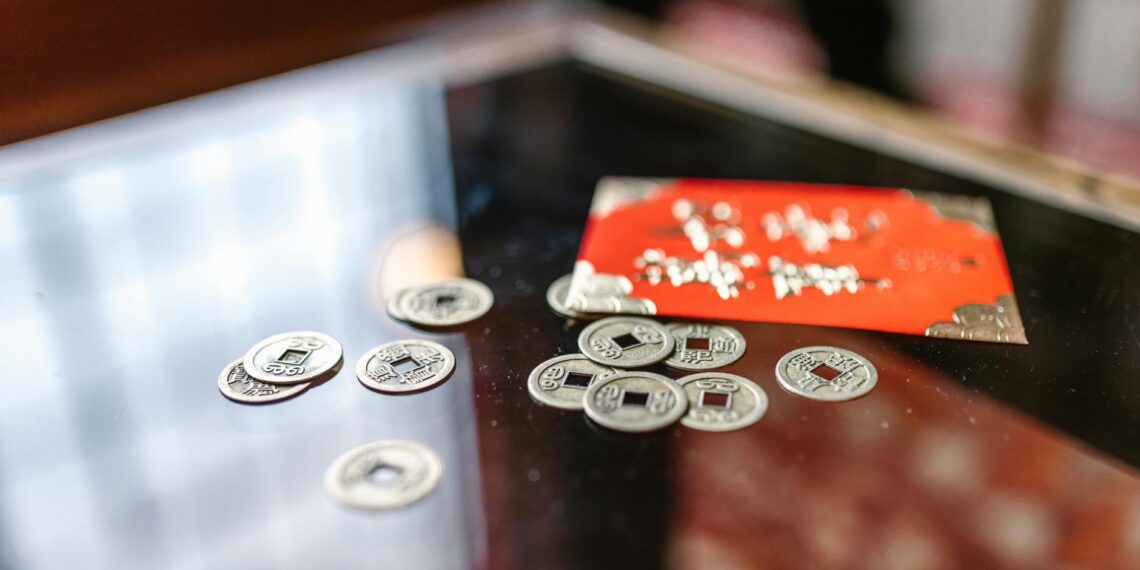Feng shui coins, also known as Chinese coins, are ancient Chinese currency replicas used as powerful symbols of wealth, good fortune, and protection. They are traditionally round with a square hole in the center, representing the harmony between heaven (circle) and earth (square). In feng shui, these coins are employed to attract positive energy, or “Qi”, and invite prosperity into various aspects of life.
Here’s a breakdown of how they’re used and their significance:
- Attracting wealth and abundance:
– Place them in the wealth corner of your house (southeast sector or the farthest left corner when standing at the main entrance facing inwards).
– Carry them in your wallet, purse, or business book.
– Hang them near the cash register or safe in businesses to boost cash flow.
– Display them above the main entrance to your home.
- Protection against negative energy and misfortunes:
– Hang them at the front door to ward off negative chi.
– Place them under the bed to attract good luck and protection while sleeping.
– String them together in the shape of a sword to ward off evil spirits.
– Hang them in your car to remove bad chi from travels.
- Enhancing specific aspects of life:
– Career: Place them near your work desk or behind it, or on your computer monitor.
– Family Harmony: Place them in the East sector.
– Mentor Luck: Hang them in the Northwest sector to attract support from influential people.
- Three coins tied with a red ribbon: This configuration symbolizes a magnet for wealth luck, representing the trinity of luck—heaven, earth, and mankind. The red ribbon is believed to empower the coins’ energy.
- Five Emperor Coins: This set of five coins represents the five most prosperous emperors in Chinese history and is used to attract wealth, luck, and protection against danger and harm. They can also represent the five feng shui elements (metal, wood, water, fire, and earth) for a balanced life.
- Eight coins: Used to attract wealth from all eight cardinal directions and repress the effects of the Illness Flying Star #2 and the #5 Yellow Flying Star (Disaster Star).
- Nine coins: Induce a state of prosperity, with nine symbolizing the unity between heaven and earth.
- Activation: Energize the coins using sunlight, moonlight water, sage, or incense sticks.
- Cleansing: Regularly cleanse feng shui coins, according to Feng Shui practitioners.
You can find various types of feng shui coins, including sets tied with red ribbons, bracelets, and I Ching divination coins, from numerous online retailers. Prices vary depending on the product, ranging from 1 USD to over 30 USD. Consider the specific feng shui principles you want to apply when choosing your coins and their configuration.
By understanding the meaning and proper placement of feng shui coins, their energy can be harnessed to invite wealth, prosperity, protection, and positive chi into your life and surroundings.









Do Feng Shui coins work?
I can help with that. In feng shui cash coins are believed to be able to attract wealth and prosperity and to ward off “evil spirits” (煞氣; shà qì). However, placing them an outward facing position is believed to cause misfortune and placing them at the wrong places supposedly attracts “evil spirits” and poverty.
How to activate feng shui coin?
From my experience, To use Brass feng shui coins, tie three coins with a red string and place them in the southeast corner of your home to attract prosperity. You can also carry these brass coins in your wallet. This will help promote the continuous flow of wealth.
Where should I put my Feng Shui coins?
East: Enhances family harmony.
Southeast: Attracts wealth and financial growth.
North: Boosts career and professional success.
Center: Promotes balance and stability in life.
What do Feng Shui coins symbolize?
The round shape of the coins denotes heaven while the square opening symbolises earth. Usually, bunches of three, six or nine Feng Shui coins are tied together with a red or yellow ribbon. Red is an auspicious colour in Feng Shui and is associated with life force, energy, vitality and protection.